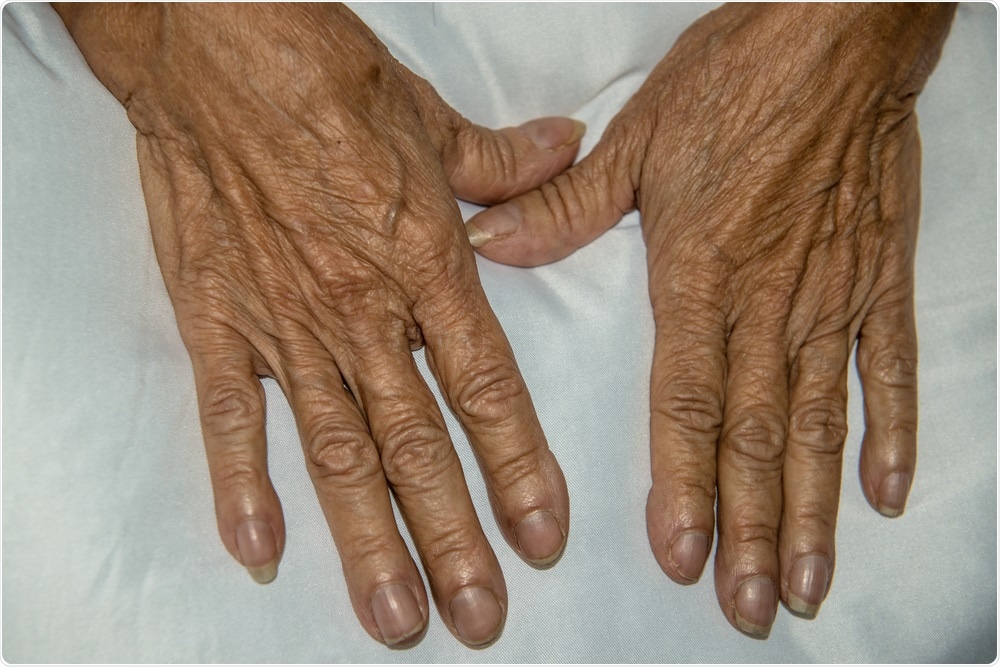Nail clubbing is characterized by specific changes around and under the toe and fingernails that are caused by certain diseases. Lung cancer is the most frequent cause of nail clubbing.

Image Credit: Douglas Olivares/Shutterstock.com
What is nail clubbing?
Nail clubbing, also called digital clubbing or Hippocratic nail, is primarily caused by an overgrowth of connective tissue and accumulation of fluid in the nail area, leading to enlargement of the terminal portion of the fingers or toes, as well as the increased diameter of the nails.
The most common symptoms of nail clubbing include softening of the nail beds, bulging and/or reddening of the terminal portion of the fingers, the formation of a sharp angle between the nail and cuticle, and downward curving of the nails.
Nail clubbing is frequently associated with diseases that reduce the oxygen level in the blood, such as congenital heart defects, chronic lung infection (bronchiectasis, cystic fibrosis, lung abscess), interstitial lung disease, lung cancer, and cardiac disorders.
Other diseases that may cause nail clubbing include hepatic cirrhosis, celiac disease, graves’ disease, dysentery, thyroid gland hyperactivation, and hepatic and gastrointestinal cancers.
Nail clubbing and hypertrophic pulmonary osteoarthropathy
Nail clubbing can be present as an independent sign or can be a part of hypertrophic pulmonary osteoarthropathy, which is characterized by bone inflammation and joint enlargement. The prevalence of hypertrophic pulmonary osteoarthropathy in patients with nail clubbing is about 10 – 20%.
In most of the cases, hypertrophic pulmonary osteoarthropathy is associated with pulmonary carcinomas, including primary and secondary lung cancers. The prevalence of hypertrophic pulmonary osteoarthropathy is highest in lung adenocarcinoma, whereas the lowest prevalence is observed in the case of small cell lung carcinoma.
Can nail clubbing be a clinical sign of lung cancer?
Lung cancer is the most common cause of nail clubbing, and about 5 – 15% of lung cancer patients are known to have signs and symptoms of nail clubbing. Among various types of thoracic cancers, lung cancer is responsible for about 80% of nail clubbing cases.
The prevalence of nail clubbing is relatively higher in patients with non-small cell lung carcinoma (35%) than small cell lung carcinoma (4%), and male patients are more likely to develop clubbing than female patients.
Nail clubbing is associated with mesothelioma, which is a type of malignancy of the lungs, abdomen, or heart caused by inhalation of asbestos fibers.
Lung metastases from extrapulmonary carcinomas are rarely associated with nail clubbing. There are a few examples of nail clubbing in patients with bone/soft tissue sarcomas, or nasopharyngeal, uterine, cervical, or renal carcinomas that have metastasized to the lungs.
Patients with Hodgkin’s lymphoma are sometimes present with nail clubbing, especially in the presence of intrathoracic malignancies.
.jpg)
Image Credit: create jobs 51/Shutterstock.com
What causes nail clubbing in lung cancer patients?
Although the exact etiology of nail clubbing is not known, it may occur due to increased blood flow to the finger area, leading to the accumulation of fluid in the soft tissues at the terminal portion of the finger and subsequent bulging of the area.
Being the most common paraneoplastic manifestation in lung cancer patients, nail clubbing may also be caused by hormones or cytokines secreted by the tumors or by the immune cells that fight against cancer cells.
In lung cancer patients with nail clubbing, the serum level of transforming growth factor beta1 (TGF beta1) is found to be increased. According to the scientific hypothesis, local release of TGF beta1 from megakaryocytes or platelet aggregates may increase the accumulation of extracellular matrix proteins, leading to nail clubbing.
Similarly, increased secretion of platelet-derived growth factor and vascular endothelial growth factor from megakaryocytes/platelet aggregates may be responsible for nail clubbing through the induction of stromal and vascular changes.
In addition, the blood level of prostaglandin E2 is found to be elevated in lung cancer patients with nail clubbing. Since prostaglandin E2 is synthesized by cyclooxygenase 2, lung cancer patients with digital clubbing may be benefited by cyclooxygenase 2 inhibitor treatment.
Further Reading
Last Updated: Aug 13, 2020